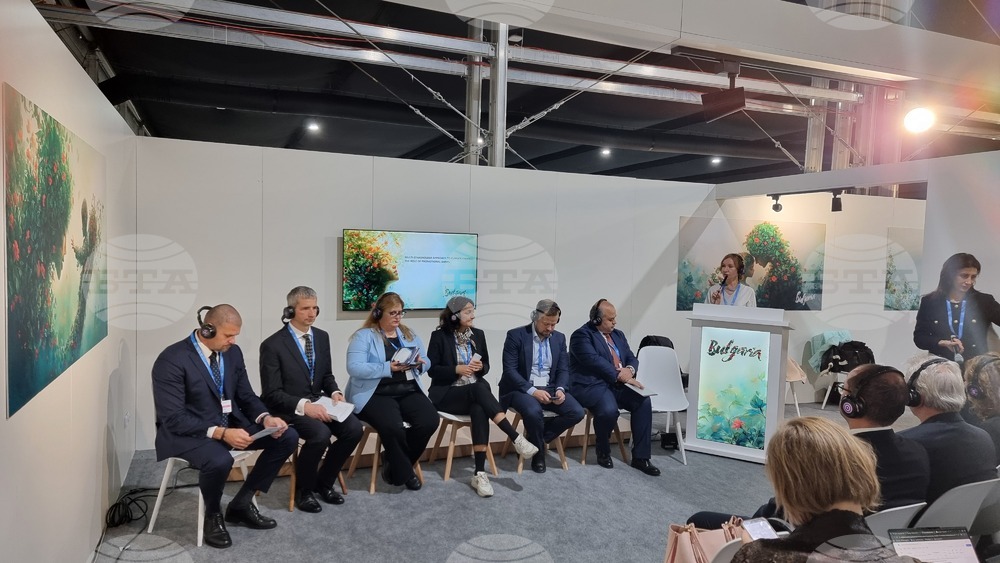site.btaFinancial Institutions Discuss Climate Investment at Bulgarian Pavilion at COP29


A discussion held Thursday at the Bulgarian pavilion at COP29 focused on the joint efforts of international financial institutions, development and commercial banks, government authorities, and private investors in ensuring climate finance. The conversation also addressed the challenge of balancing risks and bureaucratic requirements to meet the diverse needs of all participants in the process.
Earlier in the day, the Bulgarian Executive Agency for the Promotion of Small and Medium-sized Enterprises and Azerbaijan's Export and İnvestment Promotion Agency signed a Memorandum of Understanding.
Attending the event were Minister of Innovation and Growth Rosen Karadimov, Chair of the Supervisory Board of the Bulgarian Development Bank Delyana Ivanova, Bulgarian Development Bank Executive Director Iliya Karanikolov, Director for Corporates and Member of the Management Board of UniCredit Bulbank Borislav Bangeev, the Executive Director of the Sustainability Strategy of the National Development Bank of Poland, Mateusz Szczurek, Director of the Technical Assessment and Monitoring Directorate at the Council of Europe Development Bank, Tanja Faller, Senior Asset Management Director at Amber Infrastructure Dominykas Tuckus, ESG Standards, Sustainability and Transparency Expert at the International Finance Corporation (part of the World Bank Group), Ralitsa Germanova.
Caretaker Deputy Minister of Innovation and Growth Krassimir Yakimov said that the Ministry, which has co-organized events at the Bulgarian pavilion at the UN Climate Conference for the second consecutive year, supports investments in the green transition through three main mechanisms. These include managing EU-funded structural programs, investments by the Bulgarian Development Bank (BDB), which has already allocated a quarter of its portfolio to renewable energy and energy efficiency projects, and distributing European funding, budgetary support, and private capital through the Fund of Funds, Yakimov noted.
Borislav Bangeev from UniCredit Bulbank noted that joining private and public sector efforts is not easy, but it is possible. According to him, UniCredit Bulbank is the commercial bank in Bulgaria financing the largest portfolio of renewable energy projects. He provided a specific example of cooperation with a photovoltaic power plant project in the Ruse Region, financed by UniCredit with guarantees from the European Bank for Reconstruction and Development (EBRD), which also receives support from the local community.
The Executive Director of the Sustainability Strategy of the National Development Bank of Poland, Mateusz Szczurek, outlined that it is not possible for the green transition to be fully financed with public funds and for public structures to bear all the risks. Therefore, it is important to ensure that the risks of investing in climate-friendly projects are acceptable to the private sector.
According to Szczurek, another key aspect is the social cost of the transition and ensuring that it is acceptable to different groups in society. The Polish Development Bank supports the transition of the Polish economy, which has a long history in coal energy. The institution does not finance new coal energy projects, but it does finance projects for the transition to green energy, he noted.
Tanja Faller from the Council of Europe Development Bank said that transition to a low-carbon economy creates both winners and losers, but the losers are properly compensated. Ensuring social justice in the transition is the main task that the Council of Europe Development Bank sets for itself, she added.
The climate crisis is first of all a social crisis because it has uneven consequences for different social groups, she emphasized, highlighting the importance of the "quality" of climate finance. Another key aspect is financing adaptation to climate change, which does not receive the necessary attention and resources, said Faller.
Senior Asset Management Director at Amber Infrastructure Dominykas Tuckus said that from the perspective of private capital, the Three Seas initiative (an initiative which brings together 13 countries located between the Baltic, Black, and Adriatic seas) is extremely attractive, as it offers regulatory and macroeconomic stability comparable to that of Western Europe, but with a significantly higher growth rate. Additionally, the deployment and construction of green energy systems is much easier.
Iliya Karanikolov from the Bulgarian Development Bank noted that funding for climate-friendly projects is available, but there is a lack of demand. Targeted efforts are needed to familiarize potential recipients of climate finance with the opportunities available, he emphasized. Another way to increase interest in climate finance opportunities is by reducing administrative requirements, Karanikolov said, responding to the call made by Tanja Faller to collect more data on sources, targeting, and the effectiveness of allocated funds.
According to Faller, the potential of artificial intelligence must be used to achieve this without unnecessarily burdening companies and citizens.
/VE/
news.modal.header
news.modal.text